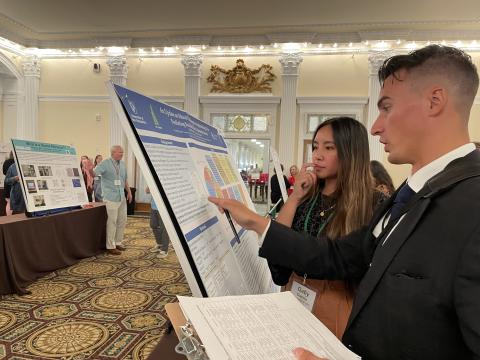Student Spotlight: Nursing's Gaby Garcia Explores the Use of AI in Suicide Risk Prediction

While some of her classmates hit the beach this summer, Gaby Garcia ‘25 hit the books to better understand a growing trend in healthcare—the integration of Artificial Intelligence (AI).
Garcia, a UNH nursing student, participated in the Summer Undergraduate Research Fellowship (iSURF) program at Dartmouth, where she was paired with Lindsay Schommer, DNP, APRN, who works in Dartmouth Hitchcock’s Epilepsy Clinic.
Schommer is part of a team involved in the development of an algorithm that uses machine learning to predict suicide risk in people with epilepsy. That model has shown an accuracy rate of 82%. Schommer’s background paired well with Garcia’s interest in AI and mental health, leading Garcia to do a literature review on the ethical challenges of using AI to predict suicide risk.
Diving into the Literature
Garcia analyzed over 100 articles before narrowing her focus to 15 key studies.
Garcia's research zeroed in on eight ethical themes, with uninformed consent, privacy and security breaches, and algorithm misuse being among the most prominent. Major questions that Garcia came up with include:
- What happens when AI models misclassify a patient?
- Who holds the responsibility?
“There’s this ambiguity around accountability,” Garcia says. “Is it the developer of the AI model? Or the healthcare provider who relied on the technology? We need to address these questions before integrating AI into clinical practice.”
Despite the challenges, Garcia sees potential for AI, noting that if implemented correctly, healthcare professionals must use it if it can prevent suicide in patients.
“We can’t over-rely on these tools,” Garcia says. “This technology should be used in conjunction with our clinical thinking and judgment, never alone.”
Garcia presented her findings at the New Hampshire Network of Biomedical Research Excellence (INBRE) annual meeting in August.
A World of Possibilities
In addition to gaining valuable research experience to pair with her clinical expertise, Garcia says the summer research program got her thinking more broadly about the future of nursing and potential career possibilities.
“It opened my eyes to all the different paths I can take beyond traditional bedside nursing,” Garcia says. “I never thought about pursuing a nursing PhD or even a master's degree in something like health data science. Now, I’m interested in working with machine learning and exploring that area because it challenges a different part of my brain, and I enjoyed that aspect.”
Beyond her research, Garcia has made her mark on the UNH nursing program through her leadership and contributions to improving student experiences. As a class representative on the UNH Nursing Undergraduate Council, she has had the opportunity to provide feedback and play an active role in strengthening the program. Additionally, in her role as treasurer for the Student Nurse Organization, Garcia has found another avenue to support her fellow students.
Garcia is still considering her career options but is confident that UNH has prepared her for what comes next.
“The professors are very passionate about what they teach and are always very supportive of making sure that you succeed in the program,” she says. “The program provides us with diverse clinical experiences in hospitals, nursing facilities, and the simulation lab.”